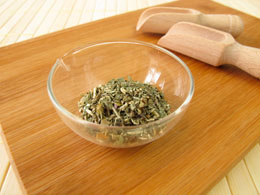The lobelia herb is a herb that consists of an alkaline relaxant called lobeline, that helps relax the respiratory passages and helps ease tension. This herb can be consumed in the form of capsules, tinctures, or even applied externally in the form of a lotion to heal skin disorders.

Also called Indian tobacco, lobelia has been touted for its health benefits for scores of decades. Native Americans are known to have smoked lobelia in order to treat asthma. Moreover, lobelia was used to induce vomiting, so as to flush out the toxins in the body. This is why, this herb is also called the 'puke weed'.
The lobelia herb has been named after the botanist Matthias de Lobel, a native of Lille. What's special about this herb is that its leaves, flowers, and seeds contains an active, alkaline, relaxant lobeline that has great health benefits. To tap these benefits, the flowers, leaves, and seeds are dried and made available to us in the form of teas, liquid tinctures, extracts, or capsules.
Uses and Benefits
Lobelia is toxic in large amounts, and even moderate doses can trigger several side effects. However, when taken in appropriate small doses, this herb can be associated to various benefits.
Respiratory Benefits
The lobeline present in the herb is a stimulant related to nicotine. This stimulant acts as a bronchodilator, thereby relieving coughs and easing asthma, chronic cough, pneumonia, and bronchitis. What lobeline actually does is it causes the bronchioles of the lungs to relax, such that the phlegm gets expelled while coughing.
In case of an asthmatic attack, this herb stimulates the adrenal glands to release more epinephrine in the blood to enhance airway relaxation. It also deals with the respiratory control center in the brain and induces more relaxed breathing required for asthma relief. You can benefit from this herb by pouring a cup of boiling water over half a teaspoon of dried lobelia leaves. Allow it to steep for 15 minutes and then sip it slowly. Having this tea twice a day can help treat respiratory issues.
Alleviates Anxiety
This lobelia herb is known to work really well on anxiety attacks. A few drops of lobelia tincture will help calm him or her. What this herb does is that it relaxes the muscles and reduces cramps, tension, and spasms. It also works on the respiratory tract and enhances calmer, deeper breathing.
Besides these two major benefits, this herbal remedy is also useful for alleviating joint and muscle inflammation. It can also treat involuntary and repetitive contractions of the colon. The lobelia plant as such if burnt is great to ward off insects. Scores of people used lobelia herb as a substitute for nicotine, due to its nicotine-like effects, however, lobelia is not an alternative and should not be used as a remedy to quit smoking.
Recommended Doses
Lobelia comes in the form of capsules (395 milligrams), lozenges (1 milligram), tablets (2 milligrams), extracts, tinctures, or dried herb. For external application, lobelia is available in the form of lotions, ointments, plasters, and suppositories. External application of lobelia is used to treat ophthalmic disorders, sprains, skin diseases, and bruises. Let's have a look at the recommended dosages.
Dried Herb: Take half teaspoon of lobelia dried herb and pour 8 oz. of boiling hot water on it. Steep for 15-20 minutes and take 2 oz. of the decoction 4 times a day. However, since the decoction tastes terrible many tend to avoid it.
Lobelia tincture: Have 18 - 60 (2 ml) drops everyday.
Liquid lobelia extract: 0.2 - 0.6 ml thrice a day.
Like with any herb, lobelia herb is also associated with various side effects, ranging from coughing, sweating, seizures, dizziness, heartburn, tremors, etc. It can also conduce to increased blood pressure and a slow pulse. Thus, one should have this herb only in small doses. Pregnant and lactating women should refrain from taking this herb. In fact, never have this herb without consulting your health care provider. You do not want to take any chances because large doses can induce coma, paralysis, and even death.
Disclaimer: This Buzzle article is for informative purposes only, and should not be used as a replacement for expert medical advice.






 Also called Indian tobacco, lobelia has been touted for its health benefits for scores of decades. Native Americans are known to have smoked lobelia in order to treat asthma. Moreover, lobelia was used to induce vomiting, so as to flush out the toxins in the body. This is why, this herb is also called the 'puke weed'.
Also called Indian tobacco, lobelia has been touted for its health benefits for scores of decades. Native Americans are known to have smoked lobelia in order to treat asthma. Moreover, lobelia was used to induce vomiting, so as to flush out the toxins in the body. This is why, this herb is also called the 'puke weed'.